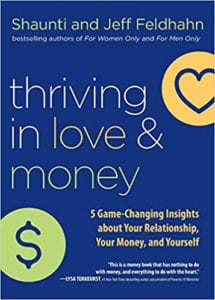Woman #1: For the most part, I believe that I handle my money well.
Man #1: Do I handle my money well? (laughs). In a word, no.
Woman #2: No. I don’t handle money very well. (laughs). I have a spending problem, so I have to try and manage my money well. I’m learning to do that.
Man #2: Money tends to be slippery. It goes places, and I don’t realize it’s leaking and going places.
Woman #3: I just kinda write checks until he puts a little Post-it note on my checkbook that says, “Stop spending money.” (laughs). And then I stop.
John Fuller: Well, maybe those comments reflect some of the challenges going on in your marriage and home. And it is funny to laugh about our differences, but what if your spouse handles money in a way that drives you crazy? Today on Focus on the Family, we’re gonna explore how husbands and wives navigate financial issues and what kind of impact that has on your marriage. Your host is Focus president and author Jim Daly, And I’m John Fuller.
Jim Daly: John, I think those giggles were kinda nervous giggles, don’t you think? When you talk about the issue of money-
John: Yeah.
Jim: … it can bring up some nerves. Because, it’s not handled that well by many. Uh, it’s one of the top two things we talk about. Intimacy in marriage and money in marriage, are kinda the two biggest issues people face. And, uh, man, we are going to get into that today and talk about how you can manage it better and honor the Lord in the way you manage it. Uh, we know that finances are important and we need to talk about it, but there can be that angst and tension whenever the topic comes up and, and maybe you feel defensive about it, and it ends up as, in an argument. Or you’d rather avoid getting into that argument, so you just don’t say anything. That’s what we’re talking about. And uh, trust me, I think many of us have been there at some point or another. Um, I know it’s been the experience of our guest today, and that’s why they’re here. They’ve written a book about it. Um, much of it from their own experience, which is always good. Uh, so I think what they’re trying to say is, we’re not perfect, but we’ve learned some things.
John: And that applies to everybody at the table, I think here, Jim. None of us is perfect-
Jim: (laughs).
John: … and, uh, we’re so glad to have Jeff and Shaunti Feldhahn here, uh, in the studio. They’ve been with us a number of times and Shaunti is a very popular speaker, author, and social researcher. Uh, Jeff is the president and CEO of a tech company. And, uh, they’ve written a book called, Thriving in Love and Money: 5 Game-Changing Insights about Your Relationship, Your Money, and Yourself. And we’ll encourage you to stop by our website to get a copy. That’s focusonthefamily.com/broadcast.
Jim: Jeff and Shaunti, welcome back to Focus on the Family.
Jeff Feldhahn: It’s great to be here.
Shaunti Feldhahn: It’s always good to be here.
Jim: All right. You’ve done this extensive research project on this topic of money and marriage. Uh, I think it took you three years, something like that.
Shaunti: Yes. It did. (laughs).
Jim: That’s a long time. You know, that’s almost outta diapers, I would think. (laughing).
Shaunti: Seriously.
Jim: Three years, man. That’s a lot of research. Uh, yet, in doing it, you noticed, (laughs), you had some personal challenges. It’s always funny when researchers notice that, uh, I got a problem in my own marriage here.
Jeff: (laughs).
Shaunti: Oh. (laughs).
Jim: So what happened? What was the light bulb? When did you go, “Uh, oh?”
Jeff: You know, we’d studied relationships and couples and ourselves-
Shaunti: All sorts of things.
Jeff: … for decades now, but this was one area that we just weren’t on the same page about. And, you know, when it came to how to handle money, quite frankly, Shaunti and I just avoided it all together.
Shaunti: We didn’t fight about it-
Jeff: No.
Shaunti: … we just really avoided the topic. We kind of did one of those things that we have now found that is the majority of couples, where, you’re technically together, but you sort of, like, “No, you do your thing over here and I’ll do my thing over here, and we just don’t talk about it.”
Jim: Yeah. Well, for the benefit of the listener, the viewer, uh, describe your money personality. Uh, Jeff, what were you? What are you?
Jeff: Yeah. I’m kind of a, um, a black and white, at least I think of myself as that way, Shaunti might think of myself as, (laughs), as… Okay.
Shaunti: No, you are black and white. That’s true. (laughs).
Jeff: And, and, and I, and I like-
Jim: Validation.
Jeff: … I like the planning for the future, I love having a plan and executing toward it.
Jim: And saver-
Jeff: And saver-
Jim: … because of that.
Jeff: Yeah.
Jim: Yeah. That would tend to follow.
Jeff: Yeah. Shaunti-
Jim: I think I know where this is going, Shaunti.
Shaunti: Yes. (laughing). A-
Jim: You don’t like much of a plan and a sale is a good thing. You can buy more.
Shaunti: A sale is a great thing, yes. No, it’s really interesting because, Jeff being the saver, me being more the spender, this is a classic dichotomy we discovered.
Jeff: And, and she wasn’t a huge spender.
Jim: Yeah.
Jeff: I mean, but she spent more than I did.
Jim: Well, the fact that you didn’t talk about it suggests that.
Jeff: Yeah.
Jim: That it never became kind of catastrophic-
Jeff: Hmm.
Jim: … it was just bubble in there.
Shaunti: Yeah. And that’s the vast majority of couples come to find out. Is that, we’re not necessarily knocked down, drag out fighting. Now, there are, (laughs), a few who do, but most of us just aren’t on the same page. We found 77% of couples just don’t talk about it. Like they can’t talk and communicate and without it getting awkward and difficult.
Jim: Yeah.
Shaunti: Only 23% can. And by the way, if I can just point out the 23% of you who are listening and you’re like, “What are you guys talking about?”
Jim: Right. (laughing). A foreign language.
Shaunti: Like, we, we think of you all as sort of mutants, you know? (laughing). Just, I don’t understand you, but I do know that that cadre exists. (laughs).
Jim: Well, we were, one of the questions I had, what in the 23% did you see in the research?
Jeff: Hmm.
Jim: If you went that deep, what were they doing that was so right?
Shaunti: Well, one of the things that… Well, it is the thing that they were doing. It is, for a subset of the population, they just kind of have no, either no disagreements, which is unusual, or they’re just okay with talking about money. It doesn’t stir up a lot of emotions, it doesn’t become awkward, it’s just their personality. You just happen to have, for example, two planners, who are married to each other.
Jeff: Right.
Shaunti: And there’s, they’re totally fine with talking about it.
John: So, I get you, and you get me and everything’s great.
Shaunti: And everything’s cool.
Jim: Well, in that area it’s gonna be good-
Shaunti: Yeah.
Jim: … but there’ll probably be other areas that might-
Shaunti: Other areas that might cause problems.
Jim: … be things to work on, right? (laughs).
Shaunti: Yes, exactly.
Jeff: Yeah. One of the things that always got me, as we were uncovering this research and the importance of being able to talk about it, was, you know, that’s easy to say, but, what that really amounts to is that, I have to actually understand what’s going on inside of me-
Jim: Hmm.
Jeff: … so that I can actually talk about it, you know, wisely or carefully or helpfully with Shaunti. And, I didn’t understand the way money hit me and made me feel-
Jim: Hmm.
Jeff: … differently, from the way it made Shaunti feel.
Shaunti: And that’s really the bottom line, that we found is at the core of the inability to communicate about money. It turns out it’s not when you’re having tension, it’s not about the money.
Jim: Right.
Shaunti: It’s about how money makes you feel.
John: Hmm.
Jim: It’s something underneath. I was gonna ask that, in terms of triggers.
Shaunti: Yeah.
Jim: You know, in marriage we often talk about emotional triggers and how that sets your spouse off when you look at them a certain way or you say something in a certain way.
Shaunti: (laughs). We have no idea what you’re talking about.
Jim: Because of the way their father treated them.
Jeff: Mm-hmm.
Shaunti: Yes, exactly.
Jim: Or something like that. And there’s legitimacy to that. We don’t want to discount that. How do you apply that kind of thing to the money issue, the underlying issues? Like when Jeff says to you, “Come on, let’s get a plan,” and you go, “Oh, that makes me feel horrible?” Why?
Shaunti: Well, I’ll te- give you a real life example. And this is hugely embarrassing to admit on the radio, but I’m gonna tell you anyway. (laughs).
Jim: Exclusive by Focus on the Family.
Shaunti: Kind of, (laughing), which is one of the things that had happened in our life for years. Is that, Jeff had always wanted to go to Dave Ramsey, at our church, to go to the course and do the stuff. And I’m like, “Oh buddy, you know, I’m-
Jim: (laughs).
Shaunti: … I’m gonna miss so many of those classes because I’m gonna be on the road and I have an event and, you know, we, I’m not gonna be able to be there all the time.” And, I wouldn’t have been able to put into words, that what it actually was, and (laughs), Jeff actually helped diagnose this. I don’t know if you wanna explain this.
Jeff: Yeah. I, I realize that, you know what Shaunti was really afraid of? Was me.
Jim: Confrontation or?
John: (laughs).
Jeff: No.
Shaunti: No.
Jeff: Was that, I was gonna come out all fired up-
John: Oh.
Jeff: … about this and put the family on the equivalent of a 500 calorie a day diet.
Jim: Right.
Jeff: And that we wouldn’t be enjoying life particularly-
Shaunti: Well, and the thing is, we wouldn’t have been able to put into words, that that was one of the big things that was my reluctance. And we have to learn to diagnose that, in order to come together well.
Jim: And again, you’ve done the research that’s 77%, that’s a preponderance of the folks.
Shaunti: Yeah.
Jeff: Mm-hmm.
Jim: What are the risk factors if they don’t start thinking differently about it? What are those, you know, if you’re talking to a doctor, if you’re eating ice cream, uh, there’s a risk factor here.
Shaunti: Yeah.
Jim: You’re gonna have heart disease most likely.
Shaunti: Yeah.
Jim: So in the money area, if, for those 77%, if they don’t start dealing with this, what are those risk factors?
Shaunti: Well, what ends up happening, we found, is that it ends up shaking people apart instead of bringing them together. Because around this topic of money, this is an example of one of those cases where you’re going in one of those two directions. And it is a classic thing that we talk about. You talk about that marriage is supposed to be one, you know, that we’re supposed to have two people become one, and money is the one area for a lot of couples-
Jim: Hmm.
Shaunti: … where that just doesn’t apply. And people are resisting kind of being one in marriage and it’s coming out and how they handle money. And so, those choices, to not talk about it, are those choices to actually institutionalize, this is, you and me, it’s not we. And when you switch that and go, “Wow, this is actually way more simple than I would’ve thought,” to be able to understand what’s going on underneath the surface, to be able to actually come together, suddenly money is no longer an opportunity for conflict. It’s this fantastic opportunity for connection and closeness.
Jim: Let me, let me throw this out there again for the listener and the viewer, because this caught my attention. You said that, in the research, that if you share separate bank accounts, that you keep your money separate, what he makes, what she makes, and you negotiate all the time about who’s paying for what, your marriage is likely to be twice at risk.
Shaunti: Yes. It’s-
Jim: Twice as much at risk. Is that fair?
Shaunti: Yes, you did.
Jim: Did I read that right?
Shaunti: It is essentially what we found is that, the happiness factor in marriage, sort of that, that enjoyment, is that if you’re not being one, you’re twice as likely to not have that sense of being happy in marriage.
Jim: Right.
Shaunti: Because this is one of these things, (laughs), that we interface with every single day. This is something that you can’t get away from, money, like, permeates everything.
Jeff: And I think one of the challenges for most of that 77%, is that, we’ve kind of all learned how to just cope with this. So, it’s one of those things that we almost don’t even recognize that we’re coping. We’ve learned how to just get along by Shaunti says, institutionalizing some things. This is the way you do things, this is the way I do things, but it isn’t oneness. It isn’t thriving-
Jim: Right.
Jeff: … in your relationship. And what happens is, I then begin to build up these assumptions about Shaunti, that, she’s just this way. Taken to the extreme, I can have that assumption be, “She’s just got a character flaw in this area.”
John: Hmm.
Shaunti: (laughs).
Jeff: “She’s just wrong.” And that runs through my-
Jim: But you never say that. (laughs).
Jeff: Oh no. (laughing). But, but it does run through my mind.
John: And it comes out-
Jeff: And, and it does.
John: … in some way.
Jeff: In some way.
Shaunti: It, it comes out for anyone who recognizes this dynamic, which is probably the majority of people, it comes out in the little eye rolls-
John: Hmm.
Shaunti: … or the feeling that, you know, one person is feeling shame or embarrassment, the other person is feeling a sense of superiority. Sorry, I don’t mean to put it that way. I’m looking at you, (laughs), as I’m saying this.
Jim: (laughs). You’re looking at him. (laughing).
Shaunti: But, but he’s raised his hand because, this is a common, common dynamic.
Jim: Mm-hmm.
Shaunti: And one of the things that we found in that, if you’re gonna get kind of what’s underneath the dynamic, and if you’re gonna try to address it and have that really abundant relationship around money that, we’re, actually, I believe we’re supposed to have, it really comes down to recognizing that some of these cases, it’s not that one person is right and the other person is wrong, we are just different.
Jim: Let’s, uh, get to a simple illustration of this. You had a Diet Coke example and everybody’s going, “What?” So how did Diet Coke inform you about your money matters?
Jeff: Y-you know, this was years and years before we ever did any of this research, before we were ever writing any books.
Shaunti: Well, this is, we were newlyweds.
Jeff: We were, we were newlyweds living in New York. We had a huge amount of student loan debt. I worked at a big law firm in New York and Shaunti worked down on Wall Street. I worked all the time, but we tried to carve out at least one or two nights a week where we would get dinner together and then I’d go back to the office, of course. Um, but as we were sitting down having dinner, Shaunti, the waiter would come by and Shaunti would go, he’d ask for the drink order and she’d order a Diet Coke. And I would of course order water, because water’s free.
Jim: How insensitive of you, Shaunti?
Jeff: And-
John: Yeah. (laughs).
Shaunti: I didn’t realize it at the time though. (laughs).
Jeff: … so, so in, in my mind I would be a little annoyed, didn’t necessarily know why-
Jim: Yeah.
Jeff: … but, you know, I would kind of get over it and the meal would go on. And then, the waiter would always come by at near the end of the meal and say, “Can I get you anything else?” To which at that time she’d say, “Can I have another Diet Coke?” And of course anyone who lives in New York knows that-
Jim: There’s no free.
Jeff: … there’s no such thing as a free refill in Manhattan.
John: (laughing).
Jeff: So of course, that’s now say, nine bucks between two Diet Cokes. I’m adding that up every time thinking, “She really doesn’t care about our student loan debt and getting out of this.”
Jim: So how did you approach this?
Jeff: Oh, I just shut down.
Jim: Oh, okay.
Jeff: And just be annoyed. And she didn’t know what was going on. She knew that I was upset, almost every meal when it ended, and I didn’t know why I was really upset.
Jim: (laughs).
Jeff: Because there was all kind of going on underneath the surface inside of me.
Shaunti: And it wasn’t honestly until we started, (laughs), writing the book and doing this research, that we were able to sort of talk back and sort of re-engineer, reverse engineer. And back to what we originally talked about at the time, months later, was, I was finally able to say, well, what it, what it is. And this was, again, the newly wed years, we didn’t know this about each other. He didn’t know at the time that I actually don’t like the taste of water-
Jim: (laughs).
Shaunti: … and I really… I know it’s weird, I’m one of these people, I just don’t like the taste of water. And so, I don’t enjoy a meal out, if I can’t have something to drink with that.
Jim: I think water technically is tasteless, but, (laughing).
Jeff: Not in New York.
Shaunti: Every, every-
Jim: But yeah, that’s true. Not in New York maybe.
Shaunti: … everybody else is, who’s listening to this is going, “Yes, you’re weird.” And there’s a few of you who go, “Yes.” ‘Cause that’s them too. But-
Jim: I feel the same about, uh, asparagus, so, don’t worry about it.
Shaunti: Okay. Well, there you go. Well, the thing for us that we wouldn’t have known if we hadn’t talked about it, is that this was just an example of the fact that we were valuing two different things.
Jim: Hmm.
Shaunti: And this is a common, daily, source of friction for a lot of couples. They don’t realize that what’s going on under the surface is, you’re just not valuing what the other person is valuing.
Jim: Hmm.
Shaunti: You kind of think of your way subconsciously is just being kind of right. Like, this is, of course, this is just the way you do it and you don’t realize, a different person, it’s legitimate that they might value something different.
Jim: Yeah.
John: And I think most people that are watching or listening have a Diet Coke illustration.
Jim: Hmm.
John: I hope that on YouTube or Facebook or somehow you’ll let us know what your Diet Coke is.
Jim: (laughing).
John: Um, I’m thinking of something in our relationship.
Jim: Yeah. What is it? Come on.
John: So I’m, I’m gonna type it up in the comments.
Jim: Okay.
John: This is Focus on the Family with Jim Daly.
Jim: Cheeky.
John: Our guests are Jeff and Shaunti Feldhahn. And, uh, we’re talking about their book Thriving in Love and Money. We’ve got it of course, at focusonthefamily.com/broadcast.
Jim: Uh, Shaunti, again, in the research, you found five, what you termed, insights-
Shaunti: Yeah.
Jim: … that really stuck out for you for the healthier side of this. What are those five insights?
Shaunti: Well, it’s essentially what are those things that are running under the surface? Right? What are the things that either cause you to have that conflict or lack of connection? Or once you’re aware of them, are the things that allow you to go, “Oh my gosh, I just didn’t realize this about my spouse,” and you grow so much closer.
Jim: And those five, again, let’s just, can we run through them?
Shaunti: Yeah, absolutely. So the first one that we cover is this concept of, you just don’t realize you’re not valuing what the other person values, right?
Jim: Yeah.
Shaunti: Like, like the diet coke example. You just don’t realize that’s what’s underneath the surface in a huge percent of cases. And that by the way, that doesn’t have to just be the Diet Coke, that can be things like, you, you’d value differently about, spending money to save time. Like, Jeff always it would drive him nuts-
Jeff: When she would, we’d wanna go out to a, a movie with a family and she would go online and order the tickets online and pay a service fee, so that we could reserve the seats. And that was extra money in my mind because, you know, you just get there early, you stand in-line, you get the seats you want anyway.
Jim: (laughing).
Jeff: And to, for her, standing in-line when she could pay two bucks per ticket, was a trade-off she would make every day of the week.
John: Mm-hmm.
Shaunti: And-
Jim: In addition to that jumbo Diet Coke-
Shaunti: Yes, exactly.
Jim: … for $14. (laughing).
Shaunti: Thank you, Jim. Thank you. Yes. So that’s an example of those value differences. There are so many of them, and I know we don’t have time to cover ’em here. Um, but the next topic that we covered actually, also, in addition to valuing different things, we also don’t realize that we actually have different insecurities and different fears and worries around money. That’s a big, big deal.
Jeff: And, and the big insight, at least for me in that one was that, we use money to calm those insecurities.
Jim: Huh.
Jeff: But one of the big problems is, by me using money to calm my particular insecurity, it’s often making her insecurity worse.
Jim: Mm-hmm.
Jeff: Her anxiety, her worry, worse.
Jim: Well, that’s a revelation, actually. That right there.
Shaunti: It’s huge. Yeah.
Jim: If you’re using money to medicate-
Jeff: Yeah.
Shaunti: Yeah.
Jim: … emotionally.
Jeff: Yeah.
Shaunti: Exactly.
Jim: Either by saving ridiculously-
Jeff: Yep.
Jim: … or spending ridiculously, that’s a problem right there. So how do you come together and say, “Time out, we’re doing something wrong?”
Shaunti: The most important thing is to realize that these fears are actually there, in yourself and in your spouse. Most people don’t even realize that. This actually was one of the few areas, in the research that turned out to be pretty strongly correlated with gender. Uh, most of the stuff in the research was not gender related at all. Like, as opposed to maybe, (laughs), what the stereotypes are, men and women are equally likely to be, for example, savers or spenders, for example. But when it came to these fears, the fear of men statistically, was much more likely to be this gut level worry of, “Am I gonna be able to provide for the family?”
Jim: Huh?
Shaunti: Like, this feeling like, “I’m always gonna be on the edge of not being able to,” and constantly in the back of their mind. That was more than two thirds of men and in previous surveys, even a higher number.
And so, because of that, there is a, a real need to try to stay away from that. Like, okay, so, “I’ll work a lot of extra hours so the boss sees me as indispensable,” like, that’s a way of medicating, right?
Jim: Sure.
Shaunti: Like, that’s a way of saying, “I’m gonna do whatever I can to soothe that fear.” Well, guess what? That takes you away from home as a dad, right? So, your wife now is going, “But we’re distant. We’re not spending time together. You’re missing Johnny’s basketball games.” And so, it triggers what is more likely statistically to be the woman’s fear. Where a guy is wondering, “Am I gonna be able to provide?”
Jim: Hmm.
Shaunti: She is more likely to be wondering, “Are we okay?” Like, “Is the family okay?”
Jim: Emotionally.
Shaunti: “Are we feeling loved?”
Jim: Right.
Shaunti: You know, that emotional security. And so what a woman statistically is more likely to do, is, “Okay. So, how can we spend more time together? Let’s go bowling. Let’s go out to dinner. Let’s spend ti- let’s go on vacation.” Well, guess what? That costs money. And so, it triggers more of his need. “Okay. Now I need to work more hours, to provide.”
Jim: Mm-hmm.
Shaunti: And so those things we do, to try to soothe our fears can without intending to, (laughs), make our partner’s fears worse. We just have to be able to talk about those things.
Jeff: Can I share a quick little example of how it would play out in our family? So when our kids were little, and invariably, some night of the week, one of the kids would wander into our bedroom and say, “My throat’s kind of sore.” To which Shaunti would immediately go into the mode of, “Tomorrow we gotta get them to the pediatrician and get a strep test.” Now we’re self-employed, we, you know, we don’t have typical health insurance. So what that would mean is that, I’m already adding up thinking, “We’re gonna go get a strep test, that’s gonna be 100 to $150 out of pocket.”
Jim: (laughs).
Jeff: “And eight outta the last 10 strep tests, have come up negative.” So I’m thinking, “I wanna take a wait and see approach. Let’s see if they get worse.” Shaunti is thinking, “No, I, I gotta figure this out now because it’s an anxiety, it’s care for my kids.” Now, honestly, I would go to her and I would try to use this example and I’d say, “Look, pioneer children didn’t run off to the pediatrician, every time that they had a sore throat.”
Jim: (laughs). Broken leg. What’s a broken leg?
Shaunti: And, uh, yeah. And they died.
Jim: Yeah. (laughing).
Jeff: Okay. So I needed a better example, but the bottom line is, I could put that out of my mind because my worry was, how are we gonna pay for this? Her worry was something totally different.
Jim: Well, and it’s interesting too, and again, we’re talking gender, but I tend to be more like Shaunti in that-
Jeff: Hmm.
Shaunti: All right. Fist bump.
Jim: … and Jane’s more like you.
Shaunti: Okay, good.
Jeff: Mm-hmm.
Jim: So it’s kinda funny-
Jeff: Yeah, yeah.
Shaunti: Yeah. Well-
Jim: … that, you know, I’m more like, “Let’s get him to the doctor” and she’s like, “Why?” (laughs).
Shaunti: This, and this is a perfect example, Jim, honestly, of the fact that that’s why we have to be super careful when we talk about this. Because, if two thirds of people felt this way, that means one third didn’t, right?
Jim: Right.
Jeff: Hmm.
Shaunti: And that it is. But the key is, you’re never gonna be able to talk about it, if you don’t, (laughs), understand-
Jeff: Understand. Yeah.
Shaunti: … what’s going on under the surface.
Jim: Yeah. And I think maybe I’ve waited too long to insert this question, but, the Lord, and where’s God in all this?
Shaunti: Yeah.
Jim: And how do you honor Him? And you’re just treading water. So you don’t, in Christian marriages particularly, you just don’t want to survive. It’s what we say every day, John, we want to thrive in Christ.
John: Mm-hmm. Mm-hmm.
Jim: And I, I guess, right at the end here, how do we do that? How do we increase our communication? What are those things that are rooted in biblical principle to say, “Okay. We’re gonna do something different today, honey?” And what do you do that’s different?
Shaunti: One of the key things that you can do that is totally different, is for you to examine, where are you in your oneness around money? Um, because we all know, (laughs), that we’re supposed to be two people who become one, and yet when it comes to this topic, often we’re not. We found that was the case for more than 80% of people was, is that there’s a significant issue of some kind, where you’re thinking of this as more of a coping, as more of a, you do your thing, I do my thing. And for example, there were a ton of people, almost half of people, Christians and not, who even were keeping separate bank accounts, so that they didn’t have to talk about money. Like, your paycheck goes into yours, my paycheck goes into mine. And it just keeps it easy. Like, you pay these bills, I pay these bills, we don’t have to come together. Now, some of the folks listening to this are going, “Well, that’s not me, you know? We, we share bank accounts, we’re one.” And okay, maybe you are, but maybe ask yourself, do you ever try to pull the Amazon package off the front step before your spouse sees it?
Jim: (laughing).
Shaunti: I mean, that’s just as much of trying to avoid being one and doing what you wanna do, as people who separate their accounts entirely. And that is not the oneness God has for us.
Jim: Hmm.
Shaunti: We have to be willing to examine our own feelings and actions around whether we are trying to institutionalize oneness the way God asked us to or not.
Jeff: Yeah. And I think it’s just, I mean, it’s exactly what Shaunti is saying, it’s humility.
Jim: Mm-hmm.
Jeff: I may not be right on everything that I perceive or think about. And I may have things to learn about myself and things to learn about my spouse. And the thing is, with the research and the principles that we were able to uncover through it, I mean, they’ll work, they’ll help you. Um, if you are a non-believer, I mean, you can apply those things and they will improve your relationship around money.
Jim: Interesting.
Jeff: But as believers, we also have the Holy Spirit in our marriage with us. And honestly with that humility, with that, asking God to help show you, what is it inside of me that’s causing me to feel this way? I didn’t realize I had some core root or reason for it and what’s inside of her? And you ask the Holy Spirit to illuminate that and to lead you into all truth. I think that’s the advantage.
Jim: Well, you said it and that’s a good place to end where we can start today, uh, by sitting down, uh, with our spouse and being humble about maybe how I’ve been looking at money-
Jeff: Mm-hmm.
Jim: … maybe the wrong approach. And I like Shaunti what you’re saying, and it’s so scriptural to start with yourself. I mean, how many times, John, have we mentioned that, no matter the topic, when it comes to marriage, that’s the best place to go.
John: Mm-hmm.
Jim: Not straightening out your spouse, let the Lord do that work, but work on yourself, ’cause that’s all you can control.
John: Mm-hmm.
Jim: We’ve said that over and over again.
John: Yeah.
Jim: Certainly having expectations and hopes for your marriage, et cetera. And if you need help, we’re here to help you.
John: Mm-hmm.
Jim: And, uh, we have Caring Christian Counselors that can guide you in this discussion process. Give you more information. Of course, Uh, Jeff and Shaunti’s wonderful book, Thriving in Love and Money, what a great resource? (laughs). And if you can make a gift of any amount, we’ll send it to you as our way of saying thank you. And lemme tell you, we believe in it so much that if you can’t afford to do that, uh, you want to save that Diet Coke money, uh, we’ll send you the book to help you in your marriage and in your discussion as our gift to you. And we’re gonna trust others will cover the cost of that. But man, let’s get working. 23% is not enough of the married couples doing well in this area. Um, obviously, the church needs to set the example, so let’s get going on it.
John: I might suggest you talk about, as a couple, getting this book and see what that does. It might surface some issues. Uh, our number here at Focus on the Family is 800, the letter A, and the word FAMILY. We are online, we’re at focusonthefamily.com/broadcast. And Jim, we should mention a couple of things. Uh, we have the, the list of five things kind of summarize, that we’ve talked about here just a little bit. Uh, we’re gonna have that online and then we’re also going to suggest that people take our marriage assessment. Uh, I think almost a million people have taken this.
Jim: That’s amazing.
John: It’s just a very quick, uh, survey of, uh, where you’re at. It’s gonna give some great ideas about strengths and weaknesses in your relationship. Again, get the book, uh, find the list, donate if you can, and take that marriage assessment all at focusonthefamily.com/broadcast.
Jim: Uh, Jeff and Shaunti, again, thank you for your examples for that humility-
John: Mm-hmm.
Jim: … and that openness, it really is helpful to all of us, uh, to apply to our own lives. Thanks for being with us.
Jeff: It’s been a pleasure.
Shaunti: Thanks so much.
John: Well, we hope you have a wonderful weekend with your family and plan to join us on Monday for, uh, some insights about everyday habits to help you build a stronger marriage.
Preview:
Dr. Randy Schroeder: Often couples stop expressing their expectations that they so much desire and requesting different things, expectations from their spouse, and they forget it’s all about the big E.
End of Preview




















